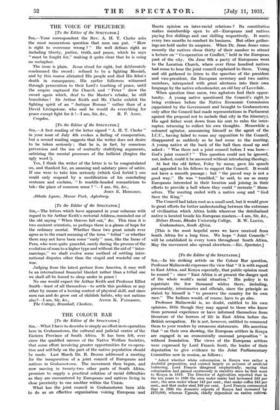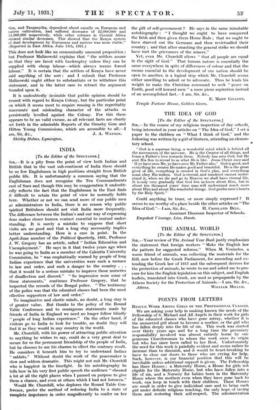[To the Editor of the SPECTATOR.] SIR, —In his striking article
on the Colour Bar question, Professor Malinowski expresses the view that" it is with regard to East Africa, and Kenya especially, that public opinion must
be roused " : since "East Africa is at present the danger spot of the whole world's racial situation." His policy is to repatriate the few thousand whites there, including, presumably, Missionaries and officials, since the principle as stated by himself is "to preserve the country for its own race." The Indians would, of course, have to go also. Professor Malinowski is, no doubt, entitled to his own opinions, little though they may appeal to those who know from personal experience or have informed themselves from literature of the horrors of life in East Africa before the British occupation. He is not, however, entitled to commend them to your readers by erroneous statements. His assertion that "on their own showing, the European settlers in Kenya are engaged in an economically unsound proposition" is without foundation. The views of the European settlers were expressed by Lord Francis Scott, the leader of their deputation to give evidence to the Joint Parliamentary Committee now in session, as follows :
"Asked whether white colonization in Kenya was rather a doubtful proposition, and existed largely on account of artificial bolstering, Lord Francis disagreed emphatically, saying that colonization had gained enormously in stability since he first went to Kenya in 1919. The Director of Agriculture reported that in the ten years to 1930 the area under maize had increased 543 per cent., the area under wheat 143 per cent., that under coffee 245 per cent., and that under sisal 349 per cent. Lord Francis commented that in 1930 the domestic exports of Kenya had increased by £670,000, whereas Uganda, chiefly'dependent on native cultivtrd
tion, and- Tanganyika, dependent about equally on European and native cultivation, had suffered decreases of £2,000,000 and £1,000,000 respectively, while other colonies in Central Africa showed similar decreases. This showed that the Kenya system of dual development by Europeans and natives was more stable." (Reported in East Africa, June 11th, 1931.) .
This does not look like an economically unsound proposition : but Professor Malinowsld explains that "the settlers assure us that they are faced with bankruptcy unless they can be supplied with cheap labour—which always means forced labour." It is certain that the settlers of Kenya have never said anything of the sort : and I submit that Professor Malinowski ought either to substantiate or to withdraw this statement, and in the latter case to retract the argument founded upon it.
It is undoubtedly desirable that public opinion should be roused with regard to Kenya Colony, but the particular point on which it seems most to require reusing is the regrettably inaccurate and misleading character of the attacks so persistently levelled against the Colony. For this there appears to be no valid excuse, as all relevant facts are clearly set 'forth in the admirable Reports of the Ormsby Gore and Hilton Young Commissions, which are accessible to all.—I • Shirley Helms, Lymink ton.



































 Previous page
Previous page